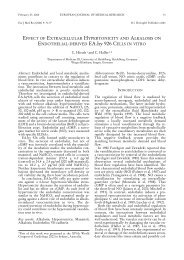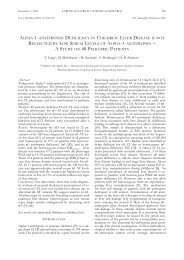European Journal of Medical Research - Deutsche AIDS ...
European Journal of Medical Research - Deutsche AIDS ...
European Journal of Medical Research - Deutsche AIDS ...
You also want an ePaper? Increase the reach of your titles
YUMPU automatically turns print PDFs into web optimized ePapers that Google loves.
June 27, 2007 EUROPEAN JOURNAL OF MEDICAL RESEARCH<br />
43<br />
HIV-Kohorte muench01<br />
Männer (%) Frauen(%)<br />
Gesamtbevölkerung Deutschland<br />
Männer (%) Frauen(%)<br />
Arbeitslosenquote 9 18 12 10<br />
Vollzeit beschäftigt 85 47 95 69<br />
Teilzeitbeschäftigt 15 53 5 31<br />
ohne<br />
Schulabschluss<br />
ohne<br />
Berufsabschluss<br />
2 12 10 16<br />
7 29 n. a. n. a.<br />
Männer (%) Frauen(%)<br />
Frauenohne<br />
Schulabschluss (%)<br />
Kaukasisch 91 57 1 15<br />
Frauenohne<br />
Berufsabschluss<br />
(%)<br />
Schwarz 4 29 19 43<br />
Asiatisch 1 8 24 70 Tabelle 1.<br />
Trotz schlechteren Bildungsniveaus der schwarzen und asiatischen<br />
Frauen sind diese mit 54% in gleichem Maße berufstätig<br />
wie die kaukasischen Frauen mit 56% (Tabelle 1).<br />
Schlussfolgerungen: Die Arbeitslosenquote in unserer HIV-<br />
Kohorte entspricht in etwa der gesamtdeutschen Arbeitslosenquote.<br />
Die berufstätigen HIV-Patienten arbeiten häufiger<br />
Teilzeit im Vergleich zur deutschen Gesamtbevölkerung. Das<br />
Bildungsniveau der in der Kohorte erfassten schwarzen und<br />
asiatischen Frauen ist wesentlich niedriger als das der<br />
Kaukasierinnen; der Anteil der berufstätigen Frauen unterscheidet<br />
sich jedoch nicht nach Ethnizität.<br />
A.46 (Poster)<br />
Migration and prostitution – not a topic in the<br />
HIV/<strong>AIDS</strong> discourse?<br />
Steffan E. 1 , Sokolowski S. 1<br />
1 SPI Forschung gGmbH, Berlin, Germany<br />
Background: The share <strong>of</strong> migrants among the sex workers<br />
in Germany has increased from 30% in the 90ies up to 70-<br />
80% to date. The legal framework regarding this particular<br />
group has also become a subject <strong>of</strong> change meanwhile. The<br />
law for protection <strong>of</strong> infectious diseases, the prostitution law<br />
and not least the EU Eastern-Enlargement have a massive impact<br />
on the living conditions <strong>of</strong> the sex workers with migration<br />
background as well as on their accessibility for prevention<br />
and health care <strong>of</strong>fers. Both laws are currently in process<br />
<strong>of</strong> amendment, which encourages a stronger focus on the HIV<br />
and STI prevention aspects for this particular group to be additionally<br />
undertaken.<br />
Method: Our thesis is based on the achievements and outcomes<br />
<strong>of</strong> several <strong>of</strong> our own studies. A total number <strong>of</strong> 157<br />
sex workers (including 28 males) with migration background<br />
were interviewed in the frame <strong>of</strong> the projects “Migration and<br />
HIV” (2004) and “BORDERNET” (2006). We tackled the issue<br />
<strong>of</strong> the change in the <strong>AIDS</strong> and STI counselling centres in<br />
the study “Health care services in transition” (2003) and “The<br />
reorganisation <strong>of</strong> the <strong>AIDS</strong>/STD counselling centres in North-<br />
Rhein–Westphalia” (2006)<br />
Results: According to our data the migrant sex workers are<br />
relatively <strong>of</strong>ten affected by STIs, whereas Gonorrhoea and<br />
Chlamydia trachomatis represent the most <strong>of</strong>ten diagnosed<br />
STIs in the group. Around 65% <strong>of</strong> the respondents have a<br />
good basic knowledge <strong>of</strong> HIV/<strong>AIDS</strong> and STIs infection and<br />
prevention but myths and fears are widely spread among the<br />
group. More than 75% <strong>of</strong> the interviewees reported that every<br />
5th to every 2nd client <strong>of</strong>fers to pay more for unsafe sex or refuses<br />
condom use. The lacking or insufficient adjustment <strong>of</strong><br />
the public health care <strong>of</strong>fers to the new legal and political<br />
framework deteriorates the access to the STI counselling services<br />
by the migrant sex workers.<br />
Discussion: Sex workers with migrant background should<br />
rely on voluntary and anonymous health care services. The<br />
latter can achieve only a certain coverage given that the services<br />
have to adapt to the new legislative conditions in the<br />
prostitution milieu. Besides the establishment <strong>of</strong> outreach services,<br />
further <strong>of</strong>fers have to be developed, which assure accessible<br />
thresholds to the available health services for the sex<br />
workers.<br />
A.47 (Vortrag)<br />
Transcultural intermediary training HIV/<strong>AIDS</strong>:<br />
A key-model for intercultural education<br />
Kimil A. 1 , Wienold M. 1 , Salman R. 2<br />
1 Ethno-Medizinisches Zentrum, MAP-Team, Hannover,<br />
Germany, 2 Ethno-Medizinisches Zentrum, Hannover,<br />
Germany<br />
Question: Intermediary Training HIV/<strong>AIDS</strong> is a structured<br />
training program developed by the Migrant-<strong>AIDS</strong>-Project in<br />
Hannover to bridge the knowledge gap between the native<br />
German and the immigrant population. The training also aims<br />
to stimulate solidarity in response to a perceived lack <strong>of</strong> support<br />
<strong>of</strong> migrants with HIV/<strong>AIDS</strong> in their own communities.<br />
Has this approach been successful?<br />
Methods: Qualitative and quantitative data from five training<br />
courses (each 50 hrs, 2002-2006) and from the intermediaries’<br />
campaigns (2006) were systematically evaluated. Feedback<br />
was also sought from public and private funders.<br />
Results: Over 100 intermediaries have participated in the project<br />
since 2002 in Hannover and Hamburg. The trainings have<br />
been highly appreciated by participants. Intermediaries have<br />
become involved in (self-) evaluation and in continued education<br />
(voluntarily). More than 200 group sessions were conducted<br />
in community settings. Data confirm earlier findings<br />
<strong>of</strong> deficits in specific sub-populations and groups. They also<br />
point to a high potential for discrimination and confirm a<br />
great distance to people with HIV. The increasing depth <strong>of</strong><br />
evaluation now brings forward detailed information on<br />
knowledge, behaviours and attitudes. Data from Hamburg





